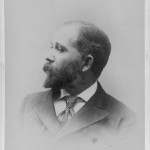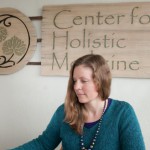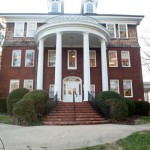- It’s complementary, my dear: Lourdes Lorenz directs Mission Hospital’s Integrative Healthcare Department, which offers therapies such as guided imagery, biofeedback, energy work, massage therapy and breathing techniques. photo by Bill Rhodes
- Healthy climate, healthy bodies: Dr. Karl von Ruck opened the 60-bed Winyah Sanitarium, one of the first private TB treatment facilities in the country, in Asheville in 1888. photo courtesy North Carolina Collection, Pack Memorial Library
- A holistic approach: West Asheville acupuncturist Nancy Hyton was in the first graduating class from Daoist Traditions, Asheville’s College of Chinese Medical Arts. photo by Bill Rhodes
- Echoes of the past: Highland Hall in Montford was once a part of Highland Hospital. The campus included landscaped grounds where patients could engage in "productive occupation.” photo couresy North Carolina Collection, Pack Memorial Public Library
- Echoes of the past: Highland Hall in Montford was once a part of Highland Hospital. The campus included landscaped grounds where patients could engage in "productive occupation.” photo by Bill Rhodes
To the Cherokee, Western North Carolina was a place for healing; to late 19th- and early 20th-century physicians, it was the place for a cure. Today, amid a boom in complementary and alternative therapies, WNC’s mountains, birthed from rock and earth, remain inextricably linked to wellness. And like the Land of the Sky’s silent sentinels, the story of how the Asheville area became a 21st-century wellness hub begins with a natural phenomenon.
Healing waters
The natural mineral waters that gave the town of Hot Springs its name were an early key to the region’s association with health, notes Richard Starnes, associate professor of history at Western Carolina University.
Originally called Warm Springs, the little hamlet on the French Broad River boasts natural pools whose temperature exceeds 100 degrees Fahrenheit. Closer to home, West Asheville’s Sulphur Springs Hotel (which burned down in 1862) and its successor, the Hotel Belmont, featured “two fine sulphur springs and several iron and lithia springs which have attracted many people to Asheville for years past on account of their medicinal properties,” according to an 1892 tourist booklet.
“I think there’s been a cultural attraction to springs of this kind,” says Starnes, the author of Creating the Land of the Sky: Tourism and Society in Western North Carolina. “Going back in British history, you’ve got people taking the waters in Bath and there’s very much a therapeutic association to it. When you get colonization and the discovery of similar kinds of springs here in Western North Carolina, it causes folks to make that connection of healing to the mountains.”
The Cherokee had made that connection before white folk found out about the warm waters. But by 1778, records show, sick settlers were braving mountain trails in search of relief.
Malaria and TB
Hot Springs wasn’t the region’s only appealing feature, however. In the 19th century, WNC’s cool summers attracted wealthy transplants from South Carolina’s swampy Low Country.
“They were literally fleeing malaria by taking these annual pilgrimages to the mountains,” notes Starnes. “And beginning in 1823, you see planters — the ones who could afford to — actually buying estates in the South Carolina Upstate and in Western North Carolina.”
By the late 1800s, Asheville’s moderate climate was being touted as an essential factor in treating ailments ranging from asthma to malaria, citing measurements of humidity, air pressure and elevation.
Several pioneering physicians set up shop here, including Dr. Karl von Ruck, who dedicated his life to the study of tuberculosis. Von Ruck moved to Asheville in 1886; two years later, he opened the 60-bed Winyah Sanitarium, among the first private TB treatment facilities in the country. At the time, “consumption” was one of the leading causes of death in the United States. For those diagnosed with the infectious disease, death loomed in every cough, and patients often died drowning in their own blood.
Von Ruck’s articles and pamphlets linking Asheville’s climate with TB treatment led more physicians to refer patients here, and the “lungers” came in droves. Between 1880 and 1890, the number of physicians in Asheville jumped from seven to 29, and in 1885, 10 of them formed the Buncombe County Medical Society. Together with the arrival of the railroad and the ensuing growth in tourism, the sanatoriums helped the city’s population quadruple during those years, from about 2,600 to more than 10,000.
According to a 1915 U.S. Public Health Service pamphlet, North Carolina had the world’s largest number of tuberculosis patients — and Asheville was smack in the center of the action. And by 1930, Asheville boasted 20 TB specialists and 25 sanatoriums with a combined capacity of 900 beds.
But even as patients (and money) poured into the region, a backlash was emerging. In the early 20th century, pioneer developer E.W. Grove began buying up sanatoriums and tearing them down to build leisure homes, seeking to strengthen Asheville as a tourist destination rather than a convalescent center.
And the discovery of streptomycin as a cure for TB in the 1940s effectively ended Western North Carolina’s close association with the disease.
A new beginning
Several decades later, however, a new chapter in the region’s health-care history began. In a big purple house just up the road from where Highland Hospital once stood, Cissy Majebe opened Asheville’s first Chinese medicine and acupuncture clinic in Montford.
“When I moved here in 1985, it was just really starting,” Majebe recalls. “John Laird was here, and George Guess. And within five years, Laird, Guess and I were all being harassed by either the medical board or the SBI.” In 1990, the State Bureau of Investigation raided her office and seized medical records, saying she was practicing medicine without a license.
The attorneys Majebe hired wanted her to say she wasn’t practicing medicine, but Majebe says she quickly fired those lawyers, telling them, “I’m absolutely practicing medicine: I’m practicing Chinese medicine.” Majebe fought back, and in 1993, she became the first chair of the newly established N.C. Acupuncture Licensing Board.
Today, Majebe is president of Daoist Traditions, an accredited college of Chinese medical arts across the street from her original acupuncture practice. “People have realized the best way to be healthy is to live healthy,” she observes. “If you can find a physician, whether it’s an acupuncturist, a medical doctor, a naturopathic physician or a chiropractor that can help you live better and [learn] how to take care of yourself, that’s the most important thing.”
Meanwhile, what was once controversial has now become mainstream: These days, the Asheville area is an alternative-medicine mecca, home to a wide variety of practitioners. Lourdes Lorenz, RN, directs Mission Hospital’s Integrative Healthcare Department, which offers such therapies as guided imagery, biofeedback, energy work, massage therapy and breathing techniques. Since it began seeing patients in August 2009, the department has received more than 12,000 requests for holistic-nursing visits.
In 2007, almost 40 percent of U.S. adults used some form of complementary or alternative medicine, according to data from the National Center for Complementary and Alternative Medicine. And despite accounting for only about one-ninth of the state’s population, Western North Carolina is now home to 47 percent of its chiropractors, 32 percent of its acupuncturists and about 30 percent of its naturopathic physicians, Lorenz reports.
That leaves the region well positioned to meet the challenges of an evolving health care system, she asserts. “We have the perfect environment to be able to pilot new models of health care, because we have a community that’s willing to be more accountable for their health.”
— Caitlin Byrd can be reached at 251-1333, ext. 140, or at cbyrd@mountainx.com.









Before you comment
The comments section is here to provide a platform for civil dialogue on the issues we face together as a local community. Xpress is committed to offering this platform for all voices, but when the tone of the discussion gets nasty or strays off topic, we believe many people choose not to participate. Xpress editors are determined to moderate comments to ensure a constructive interchange is maintained. All comments judged not to be in keeping with the spirit of civil discourse will be removed and repeat violators will be banned. See here for our terms of service. Thank you for being part of this effort to promote respectful discussion.